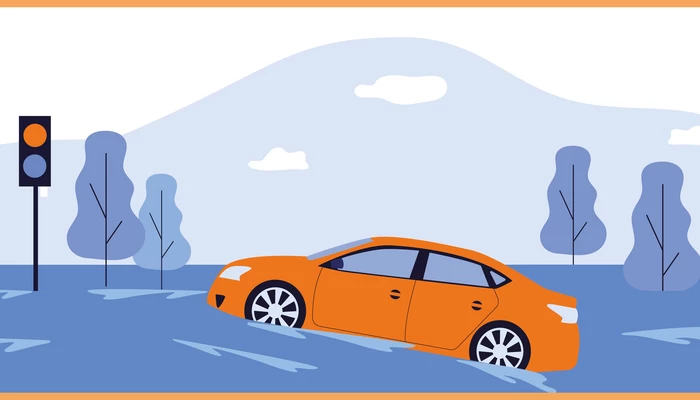Declaring a natural disaster (CATNAT)
What risks are involved?
In Montpellier, the risks that can be recognized as Catastrophes Naturelles (CatNat) are:
- Flooding
- Water and mud runoff.
- Land movements: block falls, landslides, collapse of underground cavities)
- Soil drought
If damage is caused by natural phenomena covered by your insurance company (non-cyclonic wind, hail, snow, lightning, forest fire), it will be compensated without the need to obtain recognition of the state of Catastrophe Naturel (CatNat).
How to request recognition of the state of Catastrophe Naturelle (CatNat)
The Constitution enshrines the principle of solidarity and equality of citizens before the burdens resulting from public calamities.
Natural catastrophe cover provides for the assumption of material damage caused to insured property and to them alone (buildings for residential or professional use, furniture, motor vehicles, equipment, including livestock in cowsheds and harvested crops). It comes into play in the event of abnormal intensity of a natural phenomenon and insofar as an interministerial decree, published in the Journal Officiel, declares the state of CatNat.
Declare the extent of your loss to your insurer within 5 days of the loss
The declaration Estimates the damage suffered as well as all the elements that will help determine the amount of damage to be compensated: purchase invoices, photographs of damaged goods, individual preventive measures taken....
Apply for CatNat status to Montpellier town hall
By post: Service Sécurité civile, "nature of event and date", Hôtel de Ville, 1 Place Georges Frêche, 34267 Montpellier cedex 2.
This declaration must contain at least: the date and nature of the loss; a brief description of the circumstances and causes of the loss (if flooding, specify whether from below or above and height of water, height of water observed in cm); a description of the damage observed and an approximate costing; contact details for victims (first and last name, telephone number, e-mail address, postal address).

The City will inform you as soon as the interministerial decree is published in the Journal Officiel de l'Assemblée Nationale (JOAN) noting the state of natural disaster.
Since January 1, 2023, you must send your file to your insurance company as soon as possible and no later than 30 days after publication of the decree in the Journal Officiel.
The recognition of the state of natural disaster by interministerial decree may open the right to insured coverage.
- In order to assert your rights, an "inclement weather certificate" (or insurance certificate), detailing the weather conditions that occurred on a specific day, may be requested by your insurer. This document can be obtained, for example, from Météo France
- The mayor's office should only be asked for natural events such as flooding, torrential flooding, landslides, drought/soil rehydration. Claims associated with wind, storm, snow, frost, hail are not admissible under CatNat insofar as the resulting damage may be covered by specific guarantees such as your home insurance contract;
- Investigation times are more or less important depending on the nature of the event, from a few months to a year (for example, disorders subject to drought / soil rehydration are subject to a geotechnical study over a given period by the Prefecture services.
- A legal deductible always remains payable by the insured.
Declare your claim
I've made my declaration, so what?
The mayor's office gathers the claims from the victims and compiles a file sent to the Prefecture, which includes the date and nature of the event, the damage suffered, the preventive measures taken, and previous decrees recognizing the state of natural disaster.
The departmental prefecture gathers all the claims from the communes affected by the same phenomenon, and requests additional technical reports if necessary.
An interministerial commission is responsible for ruling on the nature of the abnormal intensity of the natural agent that emerges from the technical reports attached to the files.
3 possible outcomes:
- Favorable opinion (the state of natural disaster is recognized);
- Unfavorable opinion (the abnormal intensity of the agent has not been recognized);
- Deferment (the commission will not give a final ruling until further information has been examined.
Favorable and unfavorable opinions result in a ministerial order. These opinions are then notified to each commune concerned by the prefect, together with a statement of reasons.
The interministerial order recognizing the state of natural disaster must be published in the Journal Officiel within 3 months of the applications being submitted to the prefecture (the procedure for differential movements resulting from drought and soil rehydration is, however, more important).
Recognition of the state of natural catastrophe by interministerial decree can open the right to cover policyholders against the effects of CatNat. Insureds have a maximum of 30 days after publication of the interministerial order in the Journal Officiel to send their insurance company an estimated statement of their losses (people who have made themselves known to the town hall will be notified personally of the publication of the interministerial natural disaster order).
Statutory limits on compensation
CatNat coverage does not work for:
- property that is not covered by damage insurance (e.g. graves);
- property that is generally excluded from coverage under comprehensive home insurance policies, such as fences, land or gardens for example;
- vehicles for which only compulsory third-party liability coverage has been taken out.
The law stipulates that the insurer is not obliged to grant CatNat cover in damage insurance contracts for property or activities that have been established in non-constructible zones, subsequent to the publication of a natural risk prevention plan (PPRn).
For constructions already in existence at the time of the PPRn's publication, they must be brought into compliance with the PPRn's prescriptions within 5 years. This period may be shorter in the event of an emergency.
Failure to comply would, on the one hand, mean that the insurer would no longer be obliged to grant you natural catastrophe cover; on the other hand, the prefect could give you formal notice to carry out the prescribed work, and then order it to be carried out at your expense if it has still not been done.
Excesses
A legal excess always remains payable by the insured. It amounts to:
- 380€ for residential and non-professional property;
- 1,520€ for drought or soil rehydration damage.
In the event of repeated claims, if the commune does not have a prevention plan, the deductible is modulated according to the number of declarations of a state of natural disaster made for the same risk in the five years preceding the date of the new declaration, as follows: doubled for the third declaration of disaster, tripled for the fourth and quadrupled for subsequent declarations.
This modulation of the deductible does not apply to land motor vehicles.
.


